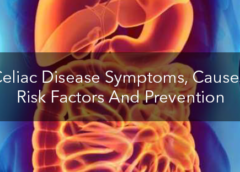Overview
Celiac disease also referred to as celiac sprue, or gluten-sensitive enteropathy is an immune response to eating gluten, protein which is found in wheat, barley, and rye.
Eating gluten can cause an immune response in your small intestine when you have celiac disease. Over time, this reaction damages your small intestine’s lining and prevents it from absorbing some nutrients. The intestinal damage often causes diarrhoea, fatigue, weight loss, bloating and anaemia, and can lead to serious complications.
Malabsorption can affect growth and development in children, in addition to causing the symptoms seen in adults.
There is no cure for celiac disease — but most people can help control symptoms by encouraging intestinal healing through a strict gluten-free diet.
Symptoms
In children and adults, the signs and symptoms of celiac disease may differ significantly and differ. Adult Digestive signs and symptoms include:
- Diarrhea
- Fatigue
- Weight loss
- Bloating and gas
- Abdominal pain
- Nausea and vomiting
- Constipation
Although, More than half of adults with celiac, have signs and symptoms not linked to the digestive system, including:
- Anemia, usually from iron deficiency
- Loss of bone density or softening of bone
- Itchy, blistery skin rash
- Mouth ulcers
- Headaches and fatigue
- Joint pain
- Reduced functioning of the spleen
Children
Children with celiac disease are more likely to have digestive problems than people, including:
- Nausea and vomiting
- Chronic diarrhoea
- Swollen belly
- Constipation
- Gas
- Pale, foul-smelling stools
The inability to absorb nutrients might result in:
- Failure to thrive for infants
- Damage to tooth enamel
- Weight loss
- Anemia
- Irritability
- Short stature
- Delayed puberty
- Neurological symptoms, including attention-deficit/hyperactivity disorder, learning disabilities, headaches, lack of muscle coordination and seizures
Dermatitis Herpetiformis
Itchy, blistering skin disease can be caused by gluten intolerance. Typically the rash occurs on the elbows, knees, chest, head, and buttocks. This disorder is also associated with changes in the lining of the small intestine that are similar to those of celiac disease but does not cause digestive symptoms in the skin.
To handle the rash, doctors treat herpetiformis dermatitis with a gluten-free diet or medicine, or both.
When to see a doctor
Consult the doctor if you have more than two weeks of diarrhoea or intestinal pain. Consult your child’s doctor if your infant is pale, irritable or struggling to develop, or has thick stools that are potbellies and foul-smelling.
Make sure to contact the doctor before taking a gluten-free diet. You will change the test results if you stop or even decreasing the amount of gluten you consume before you get tested for celiac disease.
Celiac runs in families. If anyone has the disorder in your family, ask the doctor if you should be checked. If you or someone in your family has a risk factor for celiac disease, such as type 1 diabetes, ask your doctor about tests too.
Causes
Your genes combined with consuming gluten-based foods and other factors can contribute to celiac disease, but the exact cause is not known. Practices of infant-feeding, stomach diseases, and intestinal bacteria may also lead. After surgery, pregnancy, childbirth, viral infection or extreme emotional stress, celiac disease often gets involved.
When the immune system of the body overreacts to gluten in food, the reaction destroys the tiny, hair-like (villi) projections that line the small intestines. Villi extracts vitamins and minerals from the food you consume. If your villi get hurt, no matter how much you feed, you can’t get enough nutrients.
Risk factors
Celiac disease appears to be more usual in people who have:
- Family member who has celiac disease or dermatitis herpetiformis
- Type 1 diabetes
- Down syndrome or Turner syndrome
- Autoimmune thyroid disease
- Microscopic colitis
- Addison’s disease
Complications
Untreated, celiac disease can cause:
Malnutrition: This happens if your small intestine can’t absorb adequate nutrients. Malnutrition can lead to weight loss and anaemia. Malnutrition can cause slow growth in children and short stature.
Fragile Bones: Malabsorption of calcium and vitamin D can result in bone softening in children and bone density loss in adults.
Infertility And Miscarriage: Calcium and vitamin D malabsorption may lead to reproductive problems.
Lactose Intolerance: Damage to your small intestine after eating or drinking dairy products containing lactose can cause you abdominal pain and diarrhoea. When your intestine has recovered, you can once again be able to tolerate dairy products.
Cancer: People with celiac disease who do not have a gluten-free diet have an increased risk of developing different types of cancer, including intestinal lymphoma and small cancer of the intestine.
Nervous System Problems: Some people with celiac disease can experience problems to their hands and feet, like seizures or nerve disorder.
Nonresponsive Celiac Disease
Some people with celiac disease do not respond to what they consider as a gluten-free diet. Nonresponsive celiac disease is often caused by gluten contamination of the diet. Meeting with a dietitian will help show you how to prevent gluten.
People with nonresponsive celiac disease might have:
- Bacteria in the small intestine
- Microscopic colitis
- Poor pancreas function
- Irritable bowel syndrome
- Difficulty digesting sugar found in dairy products, table sugar or a type of sugar found in honey and fruits
- Refractory celiac disease
Prevention
There are no medicines to treat celiac disease. You would need to go fully gluten-free to prevent the health issues that this can bring.
The best way to treat celiac symptoms is to eat a strict gluten-free diet. Consuming gluten-free products protects the small intestine, and prevents potential infections and inflammation.
You’ll have to stop some wheat and wheat meal foods. Remember, you cannot consume foods containing any of the following grains since they also contain gluten:
- Rye
- Barley
- Durum
- Farina
- Gram flour
- Malt
- Semolina

Leave a Reply
You must be logged in to post a comment.